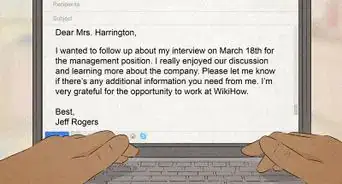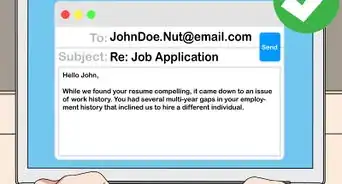This article was co-authored by Adrian Klaphaak, CPCC. Adrian Klaphaak is a career coach and founder of A Path That Fits, a mindfulness-based boutique career and life coaching company in the San Francisco Bay Area. He is also is an accredited Co-Active Professional Coach (CPCC). Klaphaak has used his training with the Coaches Training Institute, Hakomi Somatic Psychology and Internal Family Systems Therapy (IFS) to help thousands of people build successful careers and live more purposeful lives.
There are 10 references cited in this article, which can be found at the bottom of the page.
This article has been viewed 34,900 times.
Finding a job can be a real challenge, especially if you're not used to looking for one. If you know someone who is unemployed, there are ways you can successfully motivate and encourage them to find a job. First, you should speak to them to get an understanding of what they are looking for. Then, you can take a more active role in actually helping them land the position.
Steps
Motivating the Job Seeker
-
1Talk to the person about their interests and dream job. Ask the person about their dream job and what they would ideally want to do.[1] [2] Even if their dream job is currently out of reach, it can give them a good idea of the kind of jobs they should be applying to.[3]
- Talking to a person about their dream job may motivate and excite them about finding a job.
- You can say something like, "If you could have any job in the world, what would it be?"
- If the person is unsure of what kind of job they want, talk about their hobbies and interests so that you can brainstorm ideas for employment.
-
2Help the person discover their goals. Talk to the person about their goals and what they want to accomplish in the short term.[4] Setting goals can help them visualize getting a job and the benefits that come with it, which may motivate them to search harder.[5]
- You can say something like, "Where do you see yourself at the end of the year ideally? What can we do to get there?"
Advertisement -
3Discover the person's motivations. Figure out what motivates the person and emphasize the importance and necessity of having a job in order to accomplish their goals. Once you know what motivates them, you'll have the information you need to convince them to start looking for a job.[6]
- You can say something like, “Don't you want the new Mustang? If you find a job, you can probably afford to buy one.”
- Typically, people need a job to stay motivated and to feel fulfilled.
-
4Ask them why they aren’t looking if they’ve given up. If the person isn’t actively looking for a job, figure out why by asking about their values, strengths, passions, and purpose.[7] If they have become discouraged, you can try to motivate them towards getting a job or help them with applications. If it’s for another reason, you’ll have to resolve the underlying problem first, before you can motivate them to start looking.[8]
- You can say something like, "Why aren't you looking for jobs right now? Did something happen?"
- Never call the person lazy or it will discourage them.
-
5Give the person space to search. Constantly checking in and bothering the person about their job search can actually be a source of stress and anxiety which will interfere with their success.[9] Once you motivate the person to start looking, back off and give them space and time to find a job.[10]
- Being positive and encouraging will help them in their search.[11]
- Don’t ask for status updates. Wait for them to willingly give you updates.
-
6Reassure them if they are making progress. It can be tough finding a job in certain markets. If the person has been looking for a job for a long time, it could be discouraging. Talk to them about their difficulties and reassure them that they are on the right path, even if they haven’t gotten an interview or callback.[12]
- You can say something like, "I know it's tough waiting for callbacks, but you've been doing all the right things. A job will come eventually!"[13]
Finding Opportunities
-
1Send them active job listings. If you have extra time, you can send the person job listings that have been posted recently in their industry. You may find an opportunity that they overlooked. After you send the listings, ask the person whether they found it useful or helpful so that you know whether you should send more.[14]
- Speaking to the person about their ideal job will give you a good idea of what kind of jobs to look for.
- In some cases, you may need to widen your job search to other areas outside your city. This is particularly true if certain areas offer more positions in their chosen career path. For example, someone with a programming degree may decide to move to a tech center.
- Make sure to look at the job listings yourself so that you aren’t sending them spam.
-
2Look for jobs together. Looking for a job with the job seeker will give them companionship during the job search and will help motivate them to dedicate some time to it. Even if you aren't really looking for a job, you can see what's available in your industry or you can look for opportunities that would interest the job seeker.[15]
-
3Use your network to help them find a job. Post on your social media to find potential openings within your own network. You can also ask your family or friends if they know of any job openings.[16] There may be an opening that the job seeker can apply to.[17]
- A personal referral will improve the chance of the person landing the job.
-
4Attend networking events and job fairs with them. Search online to find networking events and job fairs in the industry that the person is in. Attending the job fair or networking event with them will alleviate stress related to attending and can motivate them to go.[18]
-
5Help them enroll with a staffing agency. The agency will work with them to find a suitable job placing, often in their target field. Employers pay the staffing agency to fill jobs for them. Some of the jobs will be temporary, but the person may also find a long-term fit.
- Temporary placements could allow the person to discover a career field they enjoy.
-
6Find ways they can be more competitive in the eyes of employers. In some cases, the person may need more skills, qualifications, experience, or certifications to get the job they desire. If this is the case, gather information about local or online resources where they can attain what they need. You can also help them find volunteering or internship opportunities to gain the experience that will qualify them for jobs.[19]
Helping with Applications and Interviews
-
1Ask them if they need help with the job search. Some people may not know how to properly submit their resume, cover letter, or how to look for a job online. If this is the case, ask the person if they need help applying to jobs. If they do, walk through the application process with them so that they know how to do it in the future.[20]
- Say something like, "Hey, are you having trouble submitting your applications? I can help, if you want."
- Some people may be reluctant to ask for help, which is why asking is important.
-
2Offer to help update their online profiles. If you have experience with optimizing online profiles, you may be able to help them with their LinkedIn or other networking profile. Visit their profiles first and offer your help if you notice that the profiles could use updating or optimization.[21]
- Say something like, "When was the last time you updated your online profiles? If you need help with it, I have some experience."
- Make sure that their profile picture best represents their professional side.
-
3Ask them if they want help with their resume and cover letter. Offer to review their resume and cover letter for typos. Offer advice on how to change or modify either so they can improve their chances of getting an interview.[22]
- You can say something like, "Are you having issues writing a compelling cover letter? I have some ideas that I can share with you."
- If you have experience with finding a job, you can give more useful advice on how to optimize their resume and cover letter for success.
-
4Do mock interviews to help them prepare. Search online to find the most common interview questions and practice with the person before the interview. This will help them come up with answers to questions that they will potentially be asked and calm their nerves for the real thing.[23]
- Popular interview questions include "Why should I hire you?" and "Tell me about a past work experience where you overcame an obstacle."
-
5Offer to give them a recommendation. If the job that the person is looking for requires personal recommendations, you can tell them that they can list you. Some jobs may even require a written recommendation, which you can write for them. Make sure to highlight their positive attributes if the potential employer contacts you.[24]
Talking to a Job Seeker
Expert Q&A
-
QuestionHow do you motivate someone unemployed?
 Wes PinkstonWes Pinkston is a Certified Holistic Life Coach and the Founder of Wes Pinkston Life Coaching. With more than five years of experience, he specializes in helping people achieve greater fulfillment and understand their full potential. He received his Holistic Lifestyle Coach Certification from The CHEK Institute.
Wes PinkstonWes Pinkston is a Certified Holistic Life Coach and the Founder of Wes Pinkston Life Coaching. With more than five years of experience, he specializes in helping people achieve greater fulfillment and understand their full potential. He received his Holistic Lifestyle Coach Certification from The CHEK Institute.
Certified Holistic Life Coach Have them take a look within and discover what they are truly passionate about. Knowing this, they won’t need to be motivated by some external force. If they have to be motivated, then it’s a job they are not interested in and it will be an unhappy situation every day at work.
Have them take a look within and discover what they are truly passionate about. Knowing this, they won’t need to be motivated by some external force. If they have to be motivated, then it’s a job they are not interested in and it will be an unhappy situation every day at work.
References
- ↑ Adrian Klaphaak, CPCC. Career Coach. Expert Interview. 18 December 2018.
- ↑ Wes Pinkston. Certified Holistic Life Coach. Expert Interview. 18 January 2022.
- ↑ https://www.themuse.com/advice/41-ways-to-help-a-jobsearching-friend
- ↑ Wes Pinkston. Certified Holistic Life Coach. Expert Interview. 18 January 2022.
- ↑ https://www.cnbc.com/2017/11/14/tony-robbins-how-to-motivate-someone-whos-lazy.html
- ↑ https://www.psychologytoday.com/us/blog/anxiety-files/201008/how-support-someone-who-is-unemployed-seven-steps-making-difference
- ↑ Adrian Klaphaak, CPCC. Career Coach. Expert Interview. 18 December 2018.
- ↑ https://www.psychologytoday.com/us/blog/anxiety-files/201008/how-support-someone-who-is-unemployed-seven-steps-making-difference
- ↑ Wes Pinkston. Certified Holistic Life Coach. Expert Interview. 18 January 2022.
- ↑ https://www.psychologytoday.com/us/blog/anxiety-files/201008/how-support-someone-who-is-unemployed-seven-steps-making-difference
- ↑ Wes Pinkston. Certified Holistic Life Coach. Expert Interview. 18 January 2022.
- ↑ https://www.psychologytoday.com/us/blog/anxiety-files/201008/how-support-someone-who-is-unemployed-seven-steps-making-difference
- ↑ Wes Pinkston. Certified Holistic Life Coach. Expert Interview. 18 January 2022.
- ↑ https://www.forbes.com/sites/dailymuse/2013/07/06/how-to-really-help-a-friend-job-search/2/#708c74721443
- ↑ https://www.forbes.com/sites/dailymuse/2013/07/06/how-to-really-help-a-friend-job-search/#7ea1454fc9ef
- ↑ Adrian Klaphaak, CPCC. Career Coach. Expert Interview. 18 December 2018.
- ↑ https://www.forbes.com/sites/dailymuse/2013/07/06/how-to-really-help-a-friend-job-search/#494746a5c9ef
- ↑ https://www.themuse.com/advice/41-ways-to-help-a-jobsearching-friend
- ↑ Adrian Klaphaak, CPCC. Career Coach. Expert Interview. 18 December 2018.
- ↑ https://www.forbes.com/sites/dailymuse/2013/07/06/how-to-really-help-a-friend-job-search/#494746a5c9ef
- ↑ https://www.forbes.com/sites/dailymuse/2013/07/06/how-to-really-help-a-friend-job-search/#494746a5c9ef
- ↑ https://www.forbes.com/sites/dailymuse/2013/07/06/how-to-really-help-a-friend-job-search/#494746a5c9ef
- ↑ https://www.snagajob.com/resources/helping-a-family-member-get-a-job/
- ↑ https://www.themuse.com/advice/heres-a-template-to-write-a-perfect-and-personalized-letter-of-recommendation
































-Step-20-Version-2.webp)












































